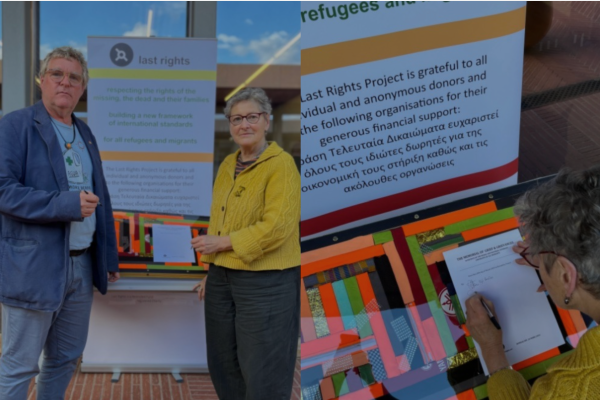Repository of Practices

Declaration for the Dignified Treatment of all Missing and Deceased Persons and their Families as a Consequence of Migrant Journeys
Dates
Type of practice
Summary
The Mytilini Declaration, and the Last Rights project, came about as a result of the numerous and dangerous migrant journeys taking place throughout the world. In the course of these journeys, there is a need for the dignified treatment of all persons, including the missing and deceased as well as their family members. The Mytilini Declaration ultimately aims to provide guidelines relating to how international law can be used to protect people’s rights in situations of border death and loss in clear, practical, and implementable terms. The beneficiaries of this practice include all actors, whether State or non-State, and will support them to perform tasks in such a way to deliver respect for the substantive rights of the missing, dead, and bereaved. On 11 May 2018, the Mytilini Declaration was agreed. This was a landmark in establishing the rights and duties towards those who experience suffering because of death or disappearance of their loved ones in the course of migrant journeys. Methoria, and Last Rights, is operated by a small team comprised of the two co-founders and two legal consultants. Its donors include the Joffe Charitable Trust, Matrix Chambers, the Oak Foundation, Fund for Global Human Rights, and Lush Charity pot.
Organizations
Main Implementing Organization(s)
Detailed Information
Benefit and Impact
Key Lessons
It was also challenging to reach consensus when drafting the Declaration. This was practical and theoretical challenge to combine the knowledge and practical skills and experience of stakeholders whilst refining the content. All contributors were experts in their own right and possessed expertise in international human rights and migrant rights. This challenge was overcome by encouraging online consultation of the draft Declaration as well as deliberation over two days before a final agreement was reached.
Since the Declaration, Last Rights has built upon and expanded its work in this area by agreeing and publishing its Memorial of Grief and Grievances which is a strong condemnation of the laws and policies which lead to the avoidable death and disappearance of many people making migrant journeys.
Recommendations(if the practice is to be replicated)
Innovation
Additional Resources
Date submitted:
Disclaimer: The content of this practice reflects the views of the implementers and does not necessarily reflect the views of the United Nations, the United Nations Network on Migration, and its members.
More Related Practices:
- Ministerio de Salud: Integrando las necesidades de salud de la población migrante y refugiada en el Perú
- Comité de Familiares de Migrantes Desaparecidos de el Progreso, Yoro, Honduras, COFAMIPRO 25 años dando la lucha en la búsqueda de personas migrantes
- Migrant Response and Resources Mechanism in Niger
- Ocean Viking - Cooperation between SOS MEDITERRANEE and IFRC for Search and Rescue and Post-Rescue Assistance and Relief
- Cooperation between Red Cross and Red Crescent National Societies and their Governments to provide humanitarian assistance and protection
Peer Reviewer Feedback:
*References to Kosovo shall be understood to be in the context of United Nations Security Council resolution 1244 (1999).
Newsletter
Subscribe to our newsletter.